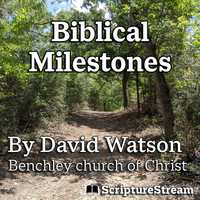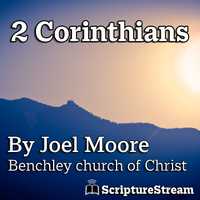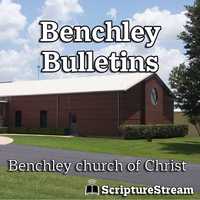The Bible stresses the importance of prayer.
- Luke 18:1 – “And he spake a parable unto them to this end, that men ought always to pray, and not to faint.”
- 1 Thessalonians 5:17 – “Pray without ceasing.”
- Ephesians 6:18 – “Praying always with all prayer and supplication.”
- Colossians 4:2 – “Continue in prayer and watch in the same with thanksgiving.”
These passages show that Christians are a praying people. Jesus’ life is a good commentary on the meanings of these passages. Thus, let us study prayer in the light of Jesus’ life.
Jesus prayed at the beginning of His ministry – at baptism.
Luke 3:21:
“Now when all the people were baptized, it came to pass, that Jesus also being baptized, and praying…”
Man begins his life in Christ at baptism. There is better way to begin one’s life in Christ than in prayer. Thus, for many years my practice has been to lead one in prayer. Can you think of a better way?
Jesus prayed at the beginning of His day.
Mark 1:35:
“And in the morning, rising up a great while before day, he went out, and departed into a solitary place, and there prayed.”
We should also begin our day in prayer. We just cannot afford to start our day without Jesus. We have an adversary (1 Peter 5:8). Our only protection is in going to Him who is more powerful. James 4:7-8 – “Submit yourselves therefore to God. Resist the devil, and he will flee from you. Draw nigh to God, and he will draw nigh to you.”
Jesus prayed at mealtime.
Matthew 15:36:
“And he took the seven loaves and the fishes, and gave thanks, and brake them, and gave to his disciples, and the disciples to the multitude.”
God created food to be received with thanksgiving. Jesus was not ashamed to thank God for the food though thousands were present. Our prayer at mealtime should not be just a custom; we should be really thankful knowing from whence the food comes. 1 Timothy 4:3 – “Forbidding to marry, and commanding to abstain from meats, which God hath created to be received with thanksgiving of them which believe and know the truth.”
Jesus prayed at the close of His day.
Matthew 14:23:
“And when he had sent the multitudes away, he went up into a mountain apart to pray; and when the evening was come, he was there alone.”
This had been a busy day for Jesus. He had been told of John’s death. He had fed five thousand. The people had tried to make Him king. After such a busy day, He made time to pray. We live in a rat-race society. Sometimes we get too busy to stop and pray. Like Jesus, we must make opportunity to pray at close of our day. That is an opportune time for family prayer. There is no better way to close the day than for the family to gather around for Bible reading and prayer.
Jesus prayed at decision time.
Luke 6:12:
“And it came to pass in those days, that he went out into a mountain to pray, and continued all night in prayer to God. 13 And when it was day, he called unto him his disciples: and of them he chose twelve, whom also he named apostles.”
We must strive to make wise decisions (Ephesians 5:15). If we really believe God knows and cares, we will consider Him in time of decisions.
Jesus prayed at Gethsemane
Mark 14:32:
“And they came to a place which was named Gethsemane: and he saith to his disciples, Sit ye here, while I shall pray. 35 And he went forward a little, and fell on the ground, and prayed.”
Years ago, Homer Hailey wrote: “No Christian can successfully fight and win his battle against the temptations of the world and the weakness of his own flesh without his Gethsemane; and that place where he fights and wins his battle is on his knees.” Like Jesus told his disciples at Gethsemane, we must watch and pray.
Jesus closed His ministry on earth in prayer.
Luke 23:34:
“Then said Jesus, Father, forgive them; for they know not what they do.”
He prayed for His enemies. He prayed as He committed Himself unto the Father. We should do likewise.
When my dad was breathing his last breath and in a semiconscious state, he was trying to pray to the Father. He was a man of prayer and as he lived so he died. I had an uncle that took God’s name in vain in almost every sentence. His son told me that when dying he was cussing up a storm. As he lived so he died. We need to learn a lesson from these two men. As we live so will we die.
So, let us pray at the beginning of our day, at mealtime, at close of day, at time of decision, at time of trial. We may know the moment of our last breath, but if we thus pray like Jesus, it will not be very long between your last prayer and your last breath.
Jesse Jenkins




